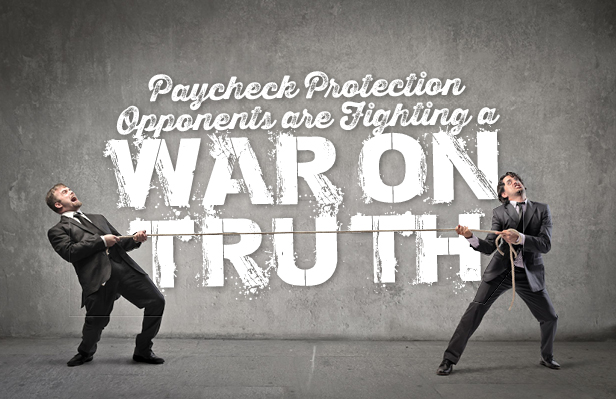Commentary

A War on Truth
Note: This commentary has appeared in the Pittsburgh Tribune-Review, the Lancaster Sunday News, the Pottstown Mercury, and at PennLive.com.
Should you be forced to subsidize government union politics? That’s the question asked by a reform gaining steam in Harrisburg called paycheck protection. But you wouldn’t know it by listening to government union bosses, who are deliberately misrepresenting paycheck protection legislation and engaging in personal attacks on its supporters in an effort to preserve their exclusive political privilege.
Pennsylvania law allows government union bosses—and only government union bosses—to negotiate the use of public resources to bundle union dues and political money and send it to union headquarters. In many cases, this dubious deal is made with politicians who receive contributions and campaign support funded by the same political money.
Paycheck protection would end this flagrant conflict of interest and level the political playing field for all.
Given their lucrative arrangement, it’s no surprise that government union leaders don’t want to play by the same rules as everyone else. They’ve launched a misinformation campaign to confuse the public and their own members about the details of paycheck protection.
For starters, they claim that only a few outside interest groups support paycheck protection. In reality, nearly 80 percent of Pennsylvanians—including 75 percent of union members—believe taxpayer resources should not be used to collect union dues and campaign contributions, according to a recent poll of likely voters.
Government union leaders also claim that paycheck protection is actually “Right to Work” in disguise. The truth is paycheck protection doesn’t affect government unions’ ability to collectively bargain. Even if paycheck protection were to pass, government workers—like most public school teachers in the state—would still have to pay union dues or fees or lose their jobs.
So, what would change? Government union leaders would simply have to collect their dues and campaign contributions directly from workers, rather than forcing taxpayers to do it for them. Either union bosses don’t understand the legislation, or they’re intentionally misleading their members and the public.
Another pernicious claim about paycheck protection is that it constitutes an attack on union members’ free speech. Nothing could be further from the truth. Paycheck protection does not stop government unions from spending money on politics; it merely removes taxpayers from the process of collecting their political money.
The U.S. Supreme Court agrees that paycheck protection supports, rather than violates, freedom of speech. In 2009, the court ruled in Ysursa v. Pocatello that Idaho’s paycheck protection law, which ended taxpayer collection of political money, “does not restrict political speech, but rather declines to promote that speech by allowing public employee check-offs for political activities.”
Indeed, requiring union leaders to collect their own political money would actually make them more responsive to members’ free speech rights.
Perhaps government union bosses’ greatest trick is claiming that dues cannot be used for politics. In reality, union dues fund a variety of political activities including lobbying, candidate endorsements, get-out-the-vote efforts, candidate and issue advocacy, contributions to “independent” political and partisan organizations, and fundraising for campaign contributions.
Pennsylvania’s major government unions spent nearly $5 million of members’ dues on lobbying and political activities in 2012—that’s according to their own reports to the U.S. Department of Labor.
Moreover, union Political Action Committee (PAC) contributions are also collected via public payroll systems. Government union PACs contributed an additional $4 million directly to candidates during the 2011-12 elections.
This perverse power cycle allows elected officials to sign checks giving money to union PACs and later accept campaign contributions from those same PACs!
Former State Senator Jane Orie was recently released from prison after being convicted of using public resources for campaigning. Why do we allow government union leaders to engage in the same behavior without batting an eye?
The debate over paycheck protection must be informed by facts, not half-truths or conspiracy theories from those clinging to their government-granted political privilege. Here’s the bottom line: Public resources should never be used for partisan politics.
# # #
Bob Dick is a policy analyst for the Commonwealth Foundation (CommonwealthFoundation.org), Pennsylvania’s free market think tank.